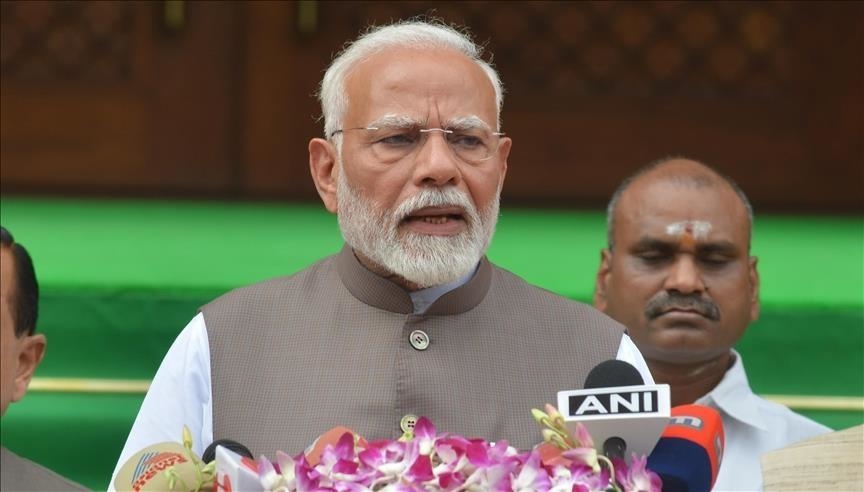Modi’s visit: What do India and Ukraine hope to gain?
New Delhi is eyeing a ‘gain in terms of optics’ after Modi’s July visit to Moscow, says Praveen Donthi, senior India analyst at International Crisis Group
 India's Prime Minister Narendra Modi
India's Prime Minister Narendra Modi
- Both sides ‘might not gain substantially’ from the trip, but it could ‘lay the foundation for strengthening ties in the longer term,’ says Donthi
- ‘Modi’s visit is a small victory for Zelenskyy, who has been wooing non-European countries,’ says Lucian Kim, International Crisis Group’s senior Ukraine analyst
ISTANBUL
Narendra Modi is visiting Ukraine for talks with President Volodymyr Zelenskyy, a first for any Indian prime minister since the countries established diplomatic ties in 1992.
He lands in Kyiv weeks after meeting Russian President Vladimir Putin in Moscow, a trip that did not go down too well in some Western capitals.
With this visit, Modi is looking to “gain in terms of optics,” while Kyiv would be hoping to get support from “one more democratic country,” according to analysts.
India has historically been aligned with Russia from the Cold War era. Once a major destination for Moscow’s defense exports, India is now the biggest importer of cheap oil from heavily sanctioned Russia.
Ahead of the trip, Modi said he would share “perspectives on a peaceful resolution of the conflict in Ukraine.”
“New Delhi would be looking to gain in terms of optics,” Praveen Donthi, senior analyst for India at the International Crisis Group, told Anadolu.
India’s foreign policy, he added, “borders on the hubristic, (so) it would be glad to be in the limelight.”
Despite being a key US ally, India has so far stopped short of condemning Russia for the Ukraine war.
Before he flew to Moscow in early July, the US urged Modi to make it clear that any resolution to the Ukraine conflict must respect Ukrainian sovereignty.
In his meeting with Putin, Modi said “war cannot solve problems” and that “peace talks cannot succeed among bombs, guns and bullets.”
‘A small victory for Zelenskyy’
Lucian Kim, senior Ukraine analyst at the International Crisis Group, believes that Modi’s “symbolic visit … will help balance out India’s role, which up to now has tilted heavily toward Russia.”
“There is a behind-the-scenes competition between Ukraine and Russia for support from non-Western countries,” Lucian told Anadolu.
So far, he said, Moscow has been “quite successful at leveraging relations with African and Asian nations that go back to Soviet times.”
“In that sense, Modi’s visit is a small victory for Zelenskyy, who has been wooing non-European countries,” he said.
“Of course, India will not stray from its line of ‘diplomacy and dialogue’ as the way to resolve the conflict. But by showing up in Kyiv, Modi will raise India’s stature on the global stage.”
Donthi reiterated that India could be “trying to strike a balance after the adverse optics of Modi’s visit to Moscow.”
The July trip coincided with a deadly strike on a children’s hospital in Kyiv that killed more than 40 people, including children.
Kyiv and its allies blamed Moscow, while Russia denied responsibility.
“Modi’s hug with Putin garnered much interest and drew scathing criticism from Zelenskyy. India’s Western allies, including the US, expressed their displeasure at the timing of his visit,” he said.
Kyiv trip could ‘strengthen ties in the longer term’
According to Donthi, both India and Ukraine “might not gain substantially” from the trip, but it could “lay the foundation for strengthening ties in the longer term.”
Bilateral trade between Ukraine and India in the first half of this year was over $1 billion. Ukraine’s main exports to India were fats and vegetable oils, maize and coal, while pharmaceutical products topped its imports from New Delhi.
India and Russia, on the other hand, saw their bilateral trade boom to over $65 billion last year, with Modi and Putin having set a target of $100 billion by the end of this decade.
“India is ostensibly looking to review and strengthen its relations with Ukraine, including agriculture, economy, defense, pharmaceuticals, and people-to-people ties,” Donthi said.
“The intangible gains would be more, as India is reiterating its stand in favor of ending the conflict through dialogue and diplomacy.”
Since the West’s expectations from New Delhi “are low because of its close ties with Moscow, whatever Modi says would be adequate,” said the analyst.
He also pointed out that Modi is “projecting this trip as its outreach to Central Europe by combining the trip with Warsaw.”
“India’s approach to navigating the geopolitics of the day necessitated this trip,” he said.
Modi was in Warsaw on Thursday, where he told Polish Prime Minister Donald Tusk that New Delhi would help in efforts to bring an end to the Ukraine war.
However, on the question of India positioning itself as a mediator, Donthi said New Delhi “realizes it lacks the diplomatic heft needed to make a difference, so it shouldn’t initiate anything on its own.”
Anadolu Agency website contains only a portion of the news stories offered to subscribers in the AA News Broadcasting System (HAS), and in summarized form. Please contact us for subscription options.







